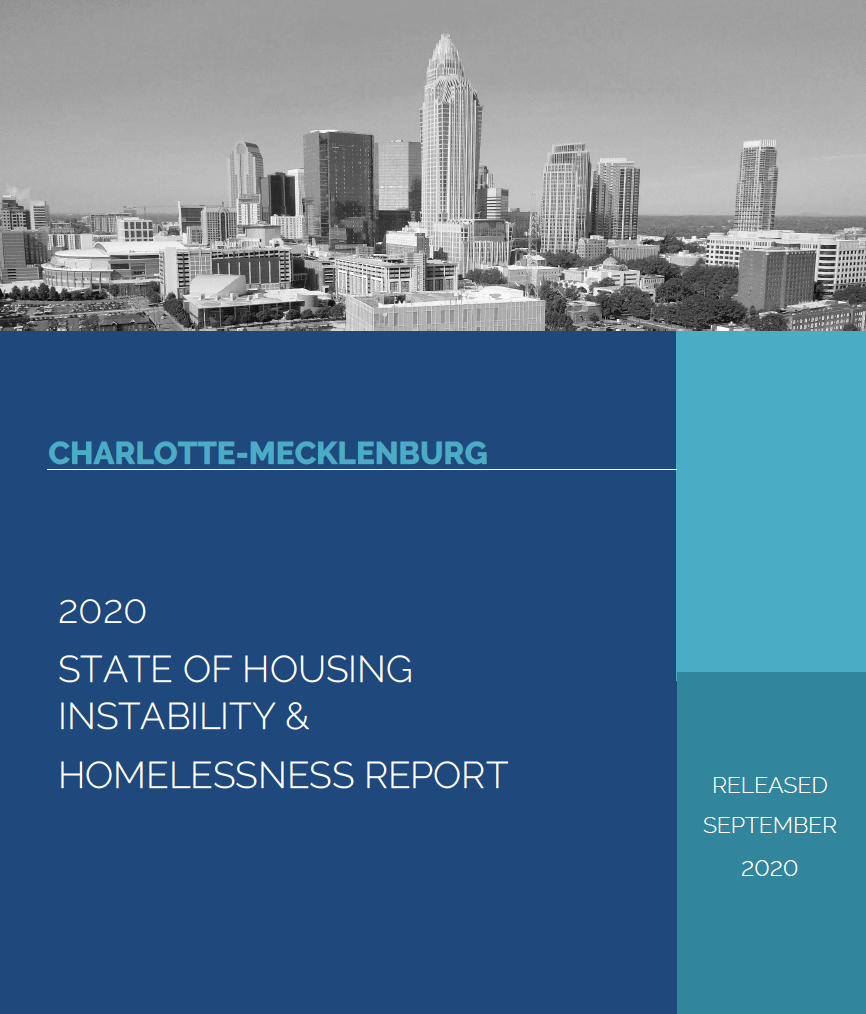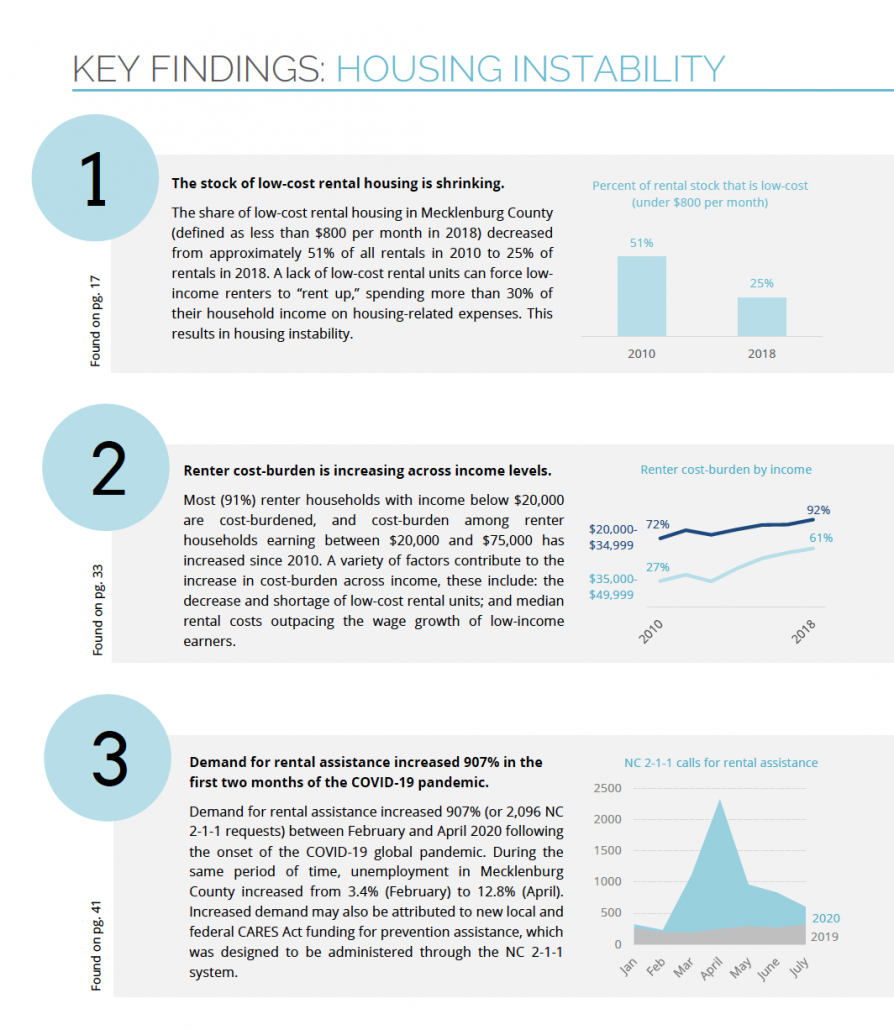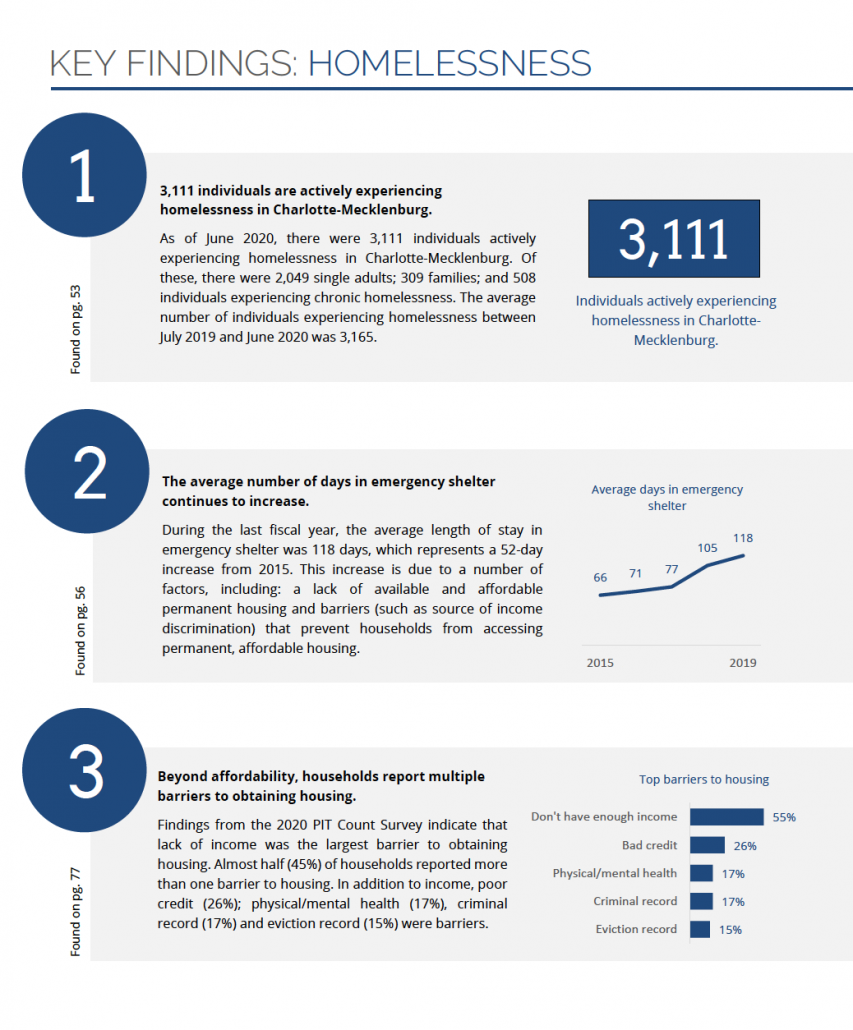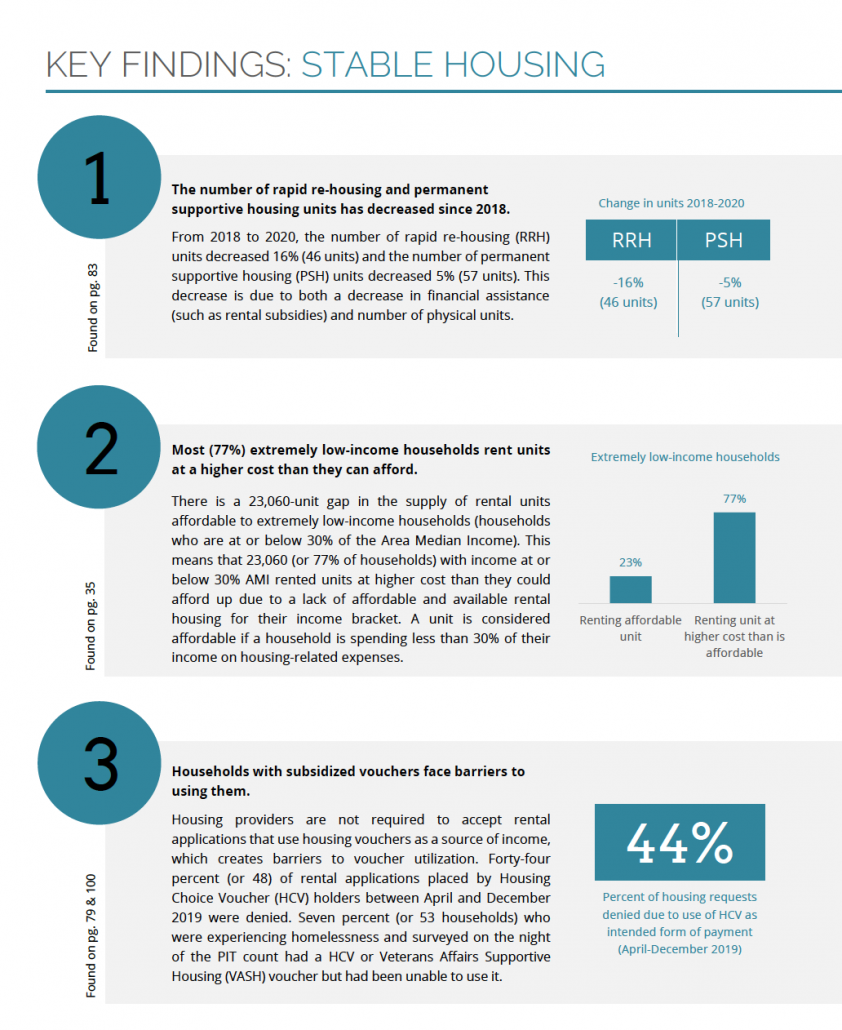Bridget Anderson
Social Research Specialist
UNCC Urban Institute
Courtney LaCaria
Housing & Homelessness Research Coordinator
Mecklenburg County Community Support Services
Mecklenburg County Community Support Services releases today the 2020 Charlotte-Mecklenburg State of Housing Instability & Homelessness (SoHIH) Report. The SoHIH report is part of the annual Housing Instability & Homelessness Report series which is funded by Mecklenburg County Community Support Services and produced by UNC Charlotte Urban Institute.
The 2020 SoHIH provides a single, dedicated compilation of all the latest data on housing instability and homelessness pertaining to Charlotte-Mecklenburg. This resource can be used by any and all stakeholders working to address housing instability and homelessness. The annual report combines local, regional, and national data on the full housing continuum (from housing instability to homelessness), and stable (permanent, affordable) housing. The report features data from the 2020 Point-in-Time Count; housing inventory and rental gaps; Housing Trust Fund; and system performance metrics.
This blog post outlines the key findings from the 2020 SoHIH and what it could mean for Charlotte-Mecklenburg.
KEY FINDINGS
Each year, the SoHIH incorporates new data and/or resources to help describe, contextualize, and quantify components along the housing continuum. The new data in the 2020 SoHIH includes information on the systemic & structural causes of housing instability and homelessness; and details on barriers to voucher utilization in Charlotte-Mecklenburg. In addition, the 2020 SoHIH report features information related to the impact of COVID-19 on both the capacity of and demand for housing related services in Charlotte-Mecklenburg.
Some of the key findings from the 2020 SoHIH report include:
- The inventory of permanent, affordable housing in Charlotte-Mecklenburg is decreasing, while the need for permanent, affordable housing increases.
- There is a 23,060-unit gap of rental units for extremely low-income households who are at or below 30% of Area Median Income in Charlotte-Mecklenburg. Seventy-seven percent of households with income at or below 30% of Area Median Income are renting units at a higher cost than they can afford, resulting in housing cost burden.
- Households with housing assistance face additional barriers, like Source of Income Discrimination (SOID), to access available permanent, affordable housing.
- The problems of housing instability and homelessness predate the COVID-19 pandemic; however, COVID-19 has exacerbated these pre-existing conditions.
- Permanent, affordable housing is critical for individual and public health.
FOR MORE INFORMATION
The SoHIH report is intended to be the “go to” community resource for information on housing instability and homelessness in Charlotte-Mecklenburg. Last week’s blog post provided an overview of the main report sections, and what is contained in each one. The report is anchored by three main sections, corresponding to the three components of the housing continuum: housing instability; homelessness; and stable (i.e. permanent and affordable) housing. The report is formatted in this way so that data and resources related to any phase in the continuum can be easily found. In addition, the three key findings for each of the report sections are available as separate, downloadable PDFs. There is also a fact sheet that distills the essential housing instability and homelessness indicators (with key definitions) into a single page (front and back) document.
SO, WHAT
The single, biggest takeaway from the 2020 SoHIH is the need for more permanent, affordable housing. The 2020 SoHIH report lays a foundation for understanding how, and to what extent, COVID-19 has exacerbated the pre-existing conditions of housing instability and homelessness. Prior to COVID-19, data indicated that more households were already facing housing instability and homelessness; and access to and availability of affordable, permanent housing was decreasing. The pandemic has also exposed the historically “hidden” populations facing housing instability and homelessness, such as families paying week to week to stay in hotels. The report indicates that, based upon current trends, it is possible that the long-term impacts of the pandemic will result in even greater numbers of people experiencing housing instability or homelessness.
Therefore, it is critical that all stakeholders use the information in the report to advocate for more permanent, affordable housing in Charlotte-Mecklenburg. To share the key findings and indicate ways to employ the report, Mecklenburg County Community Support Services has also released a community toolkit, which can be downloaded via this link.
The 2020 SoHIH and all complementary material can be found on the Charlotte-Mecklenburg Housing & Homelessness Dashboard (https://mecklenburghousingdata.org/).
SIGN UP FOR BUILDING BRIDGES BLOG
Bridget Anderson is a Social Research Specialist at the UNC Charlotte Urban Institute. She works to provide data insights for community issues relating to homelessness, public health, and social capital.
Courtney LaCaria coordinates posts on the Building Bridges Blog. Courtney is the Housing & Homelessness Research Coordinator for Mecklenburg County Community Support Services. Courtney’s job is to connect data on housing instability, homelessness and affordable housing with stakeholders in the community so that they can use it to drive policy-making, funding allocation and programmatic change.





